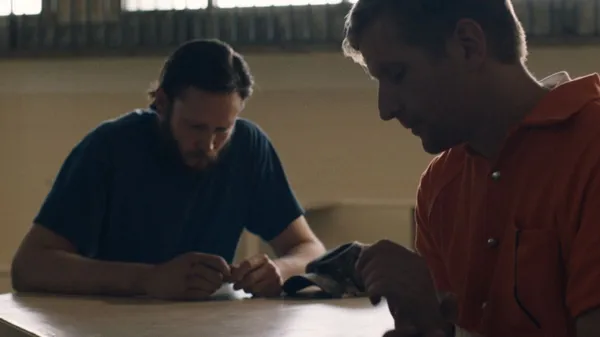Eye For Film >> Movies >> In The Radiant City (2016) Film Review
In The Radiant City
Reviewed by: Jennie Kermode

The radiant city: it began, like the nuclear family, as an ideal, a notion of the perfect way for humans to live. Le Corbusier's experimental dream defined much of what was visionary and tragic about Thirties architecture. Designed to resemble the human body, it sought to provide people with a more natural way in which to live. But nature is disorderly. The dream crumbled; the buildings stood in isolation, uncommunicative. Here Rachel Lambert extends the idea to the family unit, where relationships that are assumed undermine relationships that are needed, where connection emerges only between those who mistake each other for strangers.
Laura (Marin Ireland) is at work when it happens. He comes wandering into her supermarket and she, having dreaded this moment, runs outside and retches against the wall. Laura is a single parent and carer for her own ailing mother - her strength is at its limit and she can't handle this. But the visitor from out of town is not somebody who has abused her or who means her harm. He is her brother, Andrew (Michael Abbott Jr). He is the person responsible, as she sees it, for the long weekly trips she feels obliged to make to support her other brother, Michael (Paul Sparks) in jail.

Ireland's performance as the brittle, exhausted woman the the centre of the drama is so absorbing that it's easy to be carried along by her and miss the crucial question: why is it Andrew that she blames? Michael has committed murder. He doesn't deny it. His upcoming parole hearing will hinge of the notion that he's changed, and the family lawyer tries to convince Laura that it is more likely to be successful if Andrew testifies in support of that. But Andrew, though his mother misses him, has effectively been driven into exile. It's never quite clear why he has chosen this moment to return, and that's just one of the ambiguities that allows the film to develop beyond the central conceit.
Lambert developed the film following a series of interviews with families who had been through similar conflicts. She previously worked in documentary, but some subjects can be explored more deeply and more ethically through fiction. The format makes it easier to develop uncertainty around the context of Michael's crime. Just what did Andrew see, and what did he do? The two of them know; the other characters have already made up their minds; so nobody discusses it directly. Other events, meanwhile, reveal a different side to Andrew's character and complicate the prospect of reconciliation.
The carefully constructed atmosphere in Lambert's film doesn't allow viewers much breathing space, and during slower patches it can be hard going in the wrong way. But though it falls a little short of its dramatic potential, this is nevertheless an interesting piece that reveals considerable talent.
Reviewed on: 03 Feb 2017















